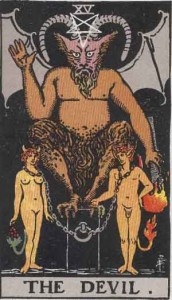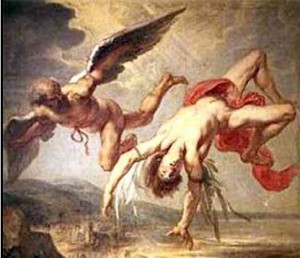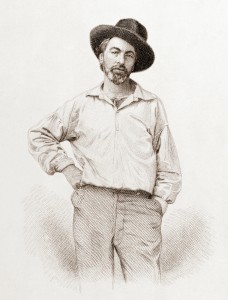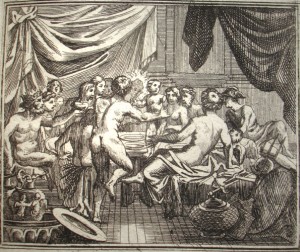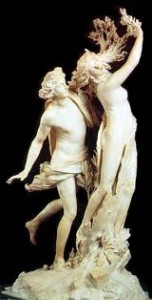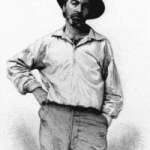This evening, under lamplight, we look at Community, and then at Devils in literature, including Milton’s Satan, Flannery O’Connor’s Misfit, RLS’s fable “The Devil and the Innkeeper”, Blake’s Proverbs of Hell, Dante’s Lucifer, the frozen mechanical monster at the centre of the Earth. But we turn more expansive as we continue with Walt Whitman’s “Song of Myself”. You are invited to attend.
Tags: A Good Man Is Hard to Find, Blake, Dante, Devil, fables, Flannery O'Connor, Inferno, Lucifer, Marriage of Heaven and Hell, Milton, Mindrolling podcast, Proverbs of Hell, Satan, Song of Myself, Sounds True, Stevenson, Walt Whitman
Podcast: Play in new window | Download
Evening under Lamplight returns to Cambridge 105 with Series 3 of the show. “There is a time … for the evening under lamplight / (The evening with the photograph album)”, and we invite you to attend as we sit together looking through some photograph albums: Greek Myths, with pictures of Daedalus, who took to the air with new skills; Everything that Rises Must Converge, looking at Mindrollingpodcast and at the tales of Mulla Nasrudin, along with a companion story from the Yiddish folk treasury; and Song of Myself, as we begin looking together at Walt Whitman’s great poem from Leaves of Grass.
Tags: Daedalus, Everything that rises must converge, Flannery O'Connor, Four Quartets, Lamplight, Mindrolling, Nasrudin, precisian, Song of Myself, T.S. Eliot, Teillard de Chardin, Walt Whitman
Podcast: Play in new window | Download
Who are these characters in the Greek myths?This will be the first podcast in a series of podcasts speaking about Greek myths. First we have this introduction, and we’ll follow that with two episodes about Trickster gods. We know Hermes is the surpreme trickster god, and who is the other? I was surprised myself to discover that Athena, goddess of wisdom, takes her place as a trickster. We’ll see more of that in the next episode.
You can read the episode below, or listen to it through the links above.
Who are these characters in the Greek myths?
The Greek gods and goddesses are sometimes depicted as comic characters, figures we’d expect to see in a situation comedy. For instance, what do you make of this story, related by Homer in the Iliad, about the time when Hera wanted the Greeks to win the Trojan War, but Zeus, Hera’s husband (and brother), the king of the gods, was, at least for the moment, giving the Trojans the advantage in battle. So Hera made a plan to get her own way. She sidled up to Aphrodite, goddess of love (who incidentally was on the Trojan side, opposed to Hera’s Greeks), and Hera pleaded with Aphrodite: “You know that magic love belt you have, the one that goes around the thighs in that slinky way? The one that makes anyone who wears it sexually irresistible? Well, look, Zeus and I are, well, having a few little problems, you know, in bed, and I was just wondering, well, I mean you don’t need any extra equipment to make you irresistible you’re so sexy. But I was just wondering if I could just borrow that belt for just one afternoon? I’m sure that’s all I need to renew our marriage. Anyway, can I please borrow it? People who aren’t as beautiful as you, really need this kind of sex aid.”
Aphrodite fell for this and gave Hera the magic sexy belt. And it worked. Hera put it on and came over to Zeus, who was excited as he hadn’t been in a long time, at least towards her. She led him to their bedroom and let him do whatever he wanted. And then what happened? Well, you know, he just fell sound asleep. And now was Hera’s chance. While Zeus was asleep, the Greeks regained the advantage on the battlefield, and by the time Zeus woke up, it was too late to save the day for the Trojans. He’d been outwitted, just like the goofy father on an old television comedy.
This is one kind of story about the Greek gods and goddesses.
Another kind of story from Greek mythology shows these characters as participants in gruesome horror movies, as when Tantalus, a mortal man, was giving a dinner to the gods at his palace, and just to test whether they really were omniscient and knew everything, he killed his little son Pelops, cut him up, and served the pieces in a stew. The gods knew perfectly well what was going on and managed to restore Pelops’ body and bring him back to life. But, alas, Demeter, the goddess of plenty, had not been in a party mood, lamenting for the loss of her daughter, and she absent-mindedly ate one of the pieces – Pelops’ shoulder, in fact. When the boy’s body was restored, therefore, his shoulder was missing, and they had to construct a new bionic shoulder for him out of ivory.
That’s bad enough, but then the story moves into a different mode: not a horror movie, but some kind of sexploitation. The restored Pelops was so beautiful that the god Poseidon fell in love with him and abducted him, keeping him for his pleasure on Mount Olympus until the boy grew to adulthood, when, presumably, his attraction for the god diminished and he was allowed to return to earth.
What is going on in these stories? They seem to feed the worst impulses in us. Oh, yes, there are some uplifting stories, and some happy endings, but, you know, there are not that many of them compared to the horrible endings.
And yet these stories have lived on through the centuries, inspiring poets, storytellers, dramatists, artists, sculptors – and now cartoonists and video-game designers. I think they live on because they’re good stories, but also because – whether we are consciously aware of it or not – they illustrate for us some quite serious truths about ourselves and the world we live in. They can add extra depth to our own lives if we give them some serious consideration, letting our imagination open to them as we would open to serious poetry. These gods and goddesses, monsters and heroes, are, we discover, personifications of (or metaphors for) spirits or forces present at all times in our lives and shaping our world.
Eros (or Cupid), for instance, the god of love, is on one level just this annoying little kid who goes around shooting gold-tipped arrows at people, who then fall in love with whomever they encounter next. A silly Valentine’s Day card image, but this boy with the magic arrows is also an externalisation of that moment of falling in love at first sight, a delightful, painful event many of us have experienced. And that unrealistic externalisation can explain what it’s like to fall in love at first sight in a way that no other explanation can do for us. Our modern scientific explanations of biology, chemistry, or psychology can speak of falling in love in terms of hormones, or psychological need, or an ancestral procreative urge. We are justly proud of our scientific explanations, but, as my man Robert Louis Stevenson has written,
there will always be hours when we refuse to be put off by the feint of explanation, nicknamed science; and demand instead some palpitating image of our estate, that shall represent the troubled and uncertain element in which we dwell, and satisfy reason by the means of art. Science writes of the world as if with the cold finger of a starfish; it is all true; but what is it when compared to the reality of which it discourses?
We can draw upon our inherited mythic images, Stevenson reminds us, that will express the feeling of these events, “the troubled and uncertain element” of falling in love. Thus we can connect to this irresponsible little deity, much of the time depicted blindfolded to remind us that we often seem to fall in love with someone we have not been seeking, someone we have not first approved of with our eyes. The love comes to us feeling as if it’s a random connection, as if someone blindfolded had arranged this. And it can come with such violence and shock that it feels like we’ve been pierced by some outside force, with no power to resist. Some arrow coming out of the blue, for instance. The Eros myth has captured the feeling of falling in love at first sight in a way that scientific explanation of chemicals and impulses cannot.
The myth is not “true” in the literal sense. There is no god Eros, or Cupid; there are no magic arrows. But on the other hand, the myth is truer than science’s cause-and-effect truths since it describes the human response to the event, rather than just the mechanical operations going on.
The Greeks knew what they were talking about when they told stories of these mythic deities. They were finding ways of speaking about what it feels like to be human. And their myths can provide us now with detailed images that articulate many of the human feelings and behaviours we experience all the time. They give us a language to understand ourselves and our world more deeply. Our task is to be grateful, and to play with our inherited imagery.
Podcast: Play in new window | Download
 Lamplight 88 Light out of darkness Series 2 of Evening under Lamplight comes to a close by offering you a little light in the darkness here at the year’s end – even if it’s just a little lamplight on a gloomy evening. See if it helps. You can attend to some absurdity, and some kindness and cheerfulness, the Winter episode of the Seasons’ cycle, and the hopeful expectation of eternal love waiting for us beyond the horizon.
Lamplight 88 Light out of darkness Series 2 of Evening under Lamplight comes to a close by offering you a little light in the darkness here at the year’s end – even if it’s just a little lamplight on a gloomy evening. See if it helps. You can attend to some absurdity, and some kindness and cheerfulness, the Winter episode of the Seasons’ cycle, and the hopeful expectation of eternal love waiting for us beyond the horizon.
Podcast: Play in new window | Download
 Lamplight 88 Light out of darkness [The Download link here is faulty. Download the podcast from the entry just above.] Series 2 of Evening under Lamplight comes to a close by offering you a little light in the darkness here at the year’s end – even if it’s just a little lamplight on a gloomy evening. See if it helps. You can attend to some absurdity, and some kindness and cheerfulness, the Winter episode of the Seasons’ cycle, and the hopeful expectation of eternal love waiting for us beyond the horizon.
Lamplight 88 Light out of darkness [The Download link here is faulty. Download the podcast from the entry just above.] Series 2 of Evening under Lamplight comes to a close by offering you a little light in the darkness here at the year’s end – even if it’s just a little lamplight on a gloomy evening. See if it helps. You can attend to some absurdity, and some kindness and cheerfulness, the Winter episode of the Seasons’ cycle, and the hopeful expectation of eternal love waiting for us beyond the horizon.
Tags: Beyond the Horizon, Bob Dylan, Cambridge Singers, candlelight, Christmas Sermon, Dr Hook, John Rutter, Journey through the Seasons, Kathryn Grody, Kinks, Kiss it away, Life goes on, light in darkness, Lorna Irvine, Robert Louis Stevenson, Silent Night, Steeleye Span, The Old Philosopher
Podcast: Play in new window | Download
It’s time for letting go, or even letting yourself go, as you accept our invitation to attend to a show with some lively songs from many regular contributors, poems from Whitman, Elizabeth Bishop, RLS, and thoughts on all of this and more from RLA, your friendly host for this occasion. See you there.
Tags: Around the Dial, Beatles, Bob Dylan, Closing Time, Dr Hook, Elizabeth Bishop, Fraggle Rock, Get Going, Going going gone, Hello Good-bye, If I'd only come and gone, Journey through the Seasons, Kinks, Leonard Cohen, Losing You, One Art, Passage to India, Randy Newman, Robert Louis Stevenson, This is the Sea, Walt Whitman, Waterboys, Where go the boats?
Podcast: Play in new window | Download
We invite you attend to children, in their innocence, their playfulness, their horror too. We have as our guests this time Donovan, the Incredible String Band, Anne Sylvestre, Mokey Fraggle, Randy Newman, Kinky Friedman, and Dylan and the Kinks, with readings from Wordsworth and RLS, plus the myth of Niobe.
Tags: Anecdote for Fathers, Anne Sylvestre, Art Lover, Child's Play, Donovan, Dylan, Fraggle Rock, Incredible String Band, Kinks, Kinky Friedman, Leave It to Beaver, Lord Protect My Child, Randy Newman, Robert Louis Stevenson, Wordsworth
Podcast: Play in new window | Download
What relationship develops in that space between the artist and the work of art, between the singer and the song, between the reader and the book? Tone brings it all to life, so we want to open and be attuned to what’s being asked of us in this space. It can happen to us anytime. We invite you to attend, and be attuned, to our show, featuring, among much else, an examination of the Daphne and Apollo story – a mythic retelling of the way the art itself loves the artist. We have on the show the Kinks, and Dylan, and the Fraggles, Leonard Cohen, the Miracles, and also a touch of raga and an ancient Greek hymn, with readings from RLS and Ovid.
Tags: ainoma, Ballad of a Thin Man, Dylan, Fraggle Rock, Kinks, Leonard Cohen, Ovid, raga, Ravi Shankar, Robert Louis Stevenson, Smokey Robinson, The Miracles
Podcast: Play in new window | Download
Ainoma, the space between, where you are in two places at once, or neither, beyond logic, confused perhaps, but open and ready for some kind of enlightenment, “about as near Nirvana as would be convenient in practical life”, as RLS says. We invite you to attend to discussion, readings and music on this theme.
Tags: ainoma, Alice through the Looking Glass, An Inland Voyage, Animals in the Zoo, Beatles, Bob Dylan, Child's Garden of Verses, Embryonic Journey, Four Quartets, I'm Only Sleeping, Incredible String Band, Japanese temple, Jefferson Airplane, Kinks, Mike Scott, Nirvana, Not Dark Yet, Open, Ram Das, Stevenson, Story-Books in Winter, T.S. Eliot, Waterboys, Wendell Berry
Podcast: Play in new window | Download
We invite you to attend to an evening, under lamplight, examining idling. There are readings from Thoreau, Whitman, Mark Twain, RLS, and lots of different kinds of music: Scottish, Yiddish, French, American country-folk, psychedelic, plus Kinks and Dylan, and a little more. Put your work aside and spend an hour here, in fruitful idleness.
